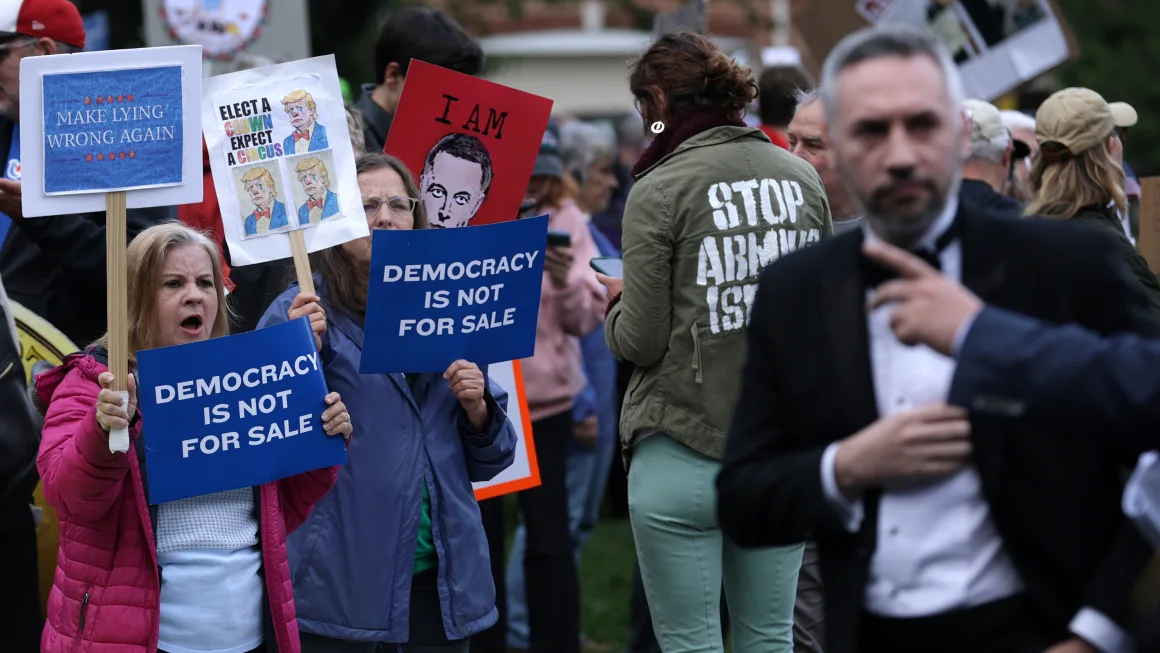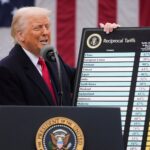At Trump National Golf Club in Potomac Falls, Virginia, more than 200 crypto investors gathered on Thursday night for what was billed as the most exclusive invite in the world: a black-tie dinner with President Donald Trump, open only to top holders of his personal meme coin, $TRUMP.
The gala, attended by celebrities, crypto moguls, and influencers, celebrated the top 220 wallets that collectively spent $148 million on the token. But beyond the luxury meal and flashy watches, the event triggered deep concerns in Washington, from ethical red flags to national security risks.
Inside the Gala: Big Wallets, Bigger Expectations
Guests dined on filet mignon and halibut under chandeliers while Trump made a 20-minute speech recounting his 2024 victory and praising crypto. Many watched as Marine One landed on the golf course, signaling the president’s arrival. He wore a navy suit, red tie, and offered light remarks before leaving in under 25 minutes.
“The food sucked,” said 25-year-old attendee Nicholas Pinto, who spent half a million dollars in $TRUMP tokens to get a seat. “No drinks except water or Trump wine. He didn’t speak to anyone except maybe the top 25.”
Despite the “VIP” designation, several top holders said even they didn’t get to shake hands with Trump. Phones were not locked away, and according to Pinto and others, security was surprisingly relaxed once Trump exited.
Foreign Influence and the Anonymous Whale Problem
A glaring issue was transparency. Blockchain data revealed that over half of the top 220 wallets were linked to foreign exchanges, and only 8 out of the top 25 holders still had their coins at dinner time. Most had already sold their tokens — many just before the event, according to leaked on-chain data.
The largest holder? Chinese-born crypto mogul Justin Sun, who holds over $22 million in $TRUMP and was recently facing paused fraud charges from the SEC. He posed at the gala with a poster listing top investors and received a custom “Trump Golden Tourbillion” watch.
Sen. Richard Blumenthal called the event “an unprecedented pay-to-play scheme,” and Sen. Chris Murphy dubbed it “the most brazenly corrupt thing a President has ever done.” Even crypto-friendly Republicans like Sen. Cynthia Lummis voiced concern.
The U.S. Constitution forbids presidents from receiving gifts from foreign nationals without congressional consent. Critics argue that Trump’s dinner effectively allowed anonymous foreign actors to buy access to the president via blockchain.
Crypto Selloff and the “Diamond Hands” Fallout
Ironically, the $TRUMP token itself didn’t benefit from the hype.
- The coin plunged 16% hours after the event
- 17 of the top 25 wallets moved tokens to centralized exchanges before the dinner
- Most of those wallets became ineligible for the promised “Diamond Hand” NFT, which was only offered to those who held their balances until the gala
“Everyone was checking their phones at dinner,” said one guest. “Half the room had already dumped their tokens before dessert.”
Political Ripple Effects: Congress Reacts
The event could now stall bipartisan crypto legislation.
Lawmakers behind the GENIUS Act — a key stablecoin regulation bill — expressed concern the dinner was a distraction from real policymaking. Sen. Josh Hawley added a controversial late-fee cap to the bill, while Senate Democrats are now pushing a provision to ban sitting presidents and top officials from profiting off crypto projects.
Rep. French Hill, a lead GOP negotiator, told CNBC: “This doesn’t help. We’re trying to regulate stablecoins — not run a campaign fundraiser disguised as a blockchain party.”
Trump’s Crypto Empire: Bigger Than Just One Token
The $TRUMP coin is just part of a broader financial ecosystem the Trump family is quietly building. The Trump Organization and affiliates reportedly control 80% of $TRUMP supply. A related stablecoin, USD1, backed by World Liberty Financial (WLFI), has already raised over $550 million in two private sales. Major backers include Abu Dhabi’s MGX fund, which recently pledged $2 billion in USD1 to Binance.
White House crypto czar David Sacks defended the administration, saying legal clarity could bring trillions in Treasury demand — but dodged questions about safeguards preventing presidential profiteering.
Final Thought: Where the Line Is — and Who Crossed It
Trump’s meme coin dinner was more than a celebration. It was a spectacle — one where foreign billionaires, policy influencers, and anonymous wallets rubbed elbows while the president blurred the line between politics and profit.
As Trump’s crypto empire expands, and legislation hangs in the balance, the biggest question isn’t whether the dinner broke rules — it’s whether the rules were ever strong enough to stop this kind of event in the first place.










